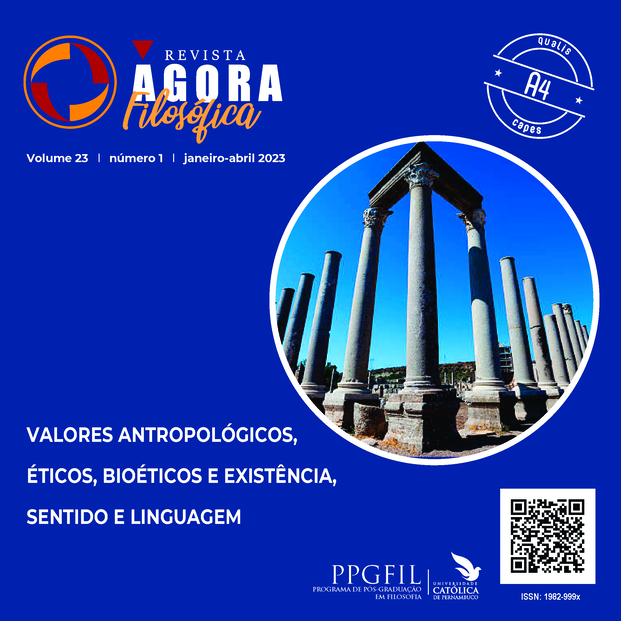Fides Qua and Fides Quae in Kierkegaard's Becoming a Christian
DOI:
https://doi.org/10.25247/P1982-999X.2023.v23n1.p43-61Keywords:
Faith, Christianity, Objectivity, Subjectivity, KierkegaardAbstract
The existential process inherent in becoming a Christian involves an escalation made up of ruptures, qualitative leaps and choices that directly reflect the existential stage in which the individual finds himself. If evolution within Christianity is possible, it is because it requires conscious action provoked by the decision that marks the transition between qualitative spheres. Both the aesthetic dimension and the ethical dimension of Christianity proved to be insufficient to lead Man to the rebirth inherent in becoming a Christian. Only the religious stage finds faith and only this mediates Christian becoming and the edifying construction of the self; therefore, it is necessary to understand the function of faith in this process and which faith it is about. It is necessary to establish the relationship between fides quae and fides qua, between the object of faith and the attitude of faith. According to the theological tradition, fides qua indicates the subjective act of believing, faith in its pure form, while fides quae indicates the object of belief, which in Christianity is identified with the content of revelation. The conversion of becoming a Christian would take place through the belief in the Christ in line with the relationship that subjectivity maintains with divine transcendence. To understand the correlation between fides qua and fides quae in Kierkegaardian philosophy is to understand what the Christianity idealized by the Danish author is about and to perceive the relationship between subjectivity and objectivity in the task of becoming a Christian.
Downloads
References
ADORNO, Theodor W. Kierkegaard: construção do estético. Tradução de Alvaro L. M. Valls. São Paulo: UNESP, 2010.
BÍBLIA. Português. Bíblia de Jerusalém. Tradução do texto em língua portuguesa diretamente de La Bible de Jérusalem, edição de 1998. São Paulo: Paulus, 2002.
DOWELL, João A. Mac. O retorno à metafísica e à religião no mundo contemporâneo. In: MAIA, Antônio Glaudenir Brasil (Org.) Filosofia e religião: fenômeno religioso no mundo (pós) secular. Porto Alegre, RS: Editora Fi, 2018, p. 13 – 42.
KIERKEGAARD, S. A. A Neutralidade Armada ou sobre a minha posição como um autor cristão na Cristandade. Tradução de Marcio Gimenes de Paula. In: ROOS, Jonas (Organizador). Revista Brasileira de Filosofia da Religião: Dossiê Kierkegaard e a Religião. Brasília: v. 8 Nº. 1, 2021, p. 352 – 367.
KIERKEGAARD, S, A. La dialéctica de la comunicación ética y ético-religiosa. Introducción de Francesc Torralba. Traducción de José García Martín. Barcelona: Herder Editorial, S. L., 2017.
KIERKEGAARD, S. A. O conceito de ironia: constantemente referido a Sócrates. Apresentação e tradução de Álvaro Luiz Montenegro Valls. 3. ed. Petrópolis: Vozes, 2010b.
KIERKEGAARD, S. A. Pós-escrito às migalhas filosóficas, vol. I / Søren Aabye kierkegaard; tradução de Álvaro Luiz Montenegro Valls e Marília Murta de Almeida. Petrópolis, RJ: Vozes, 2013.
KIERKEGAARD, S. A. Pós-escrito às migalhas filosóficas, vol. II / Søren Aabye kierkegaard; tradução de Álvaro Luiz Montenegro Valls e Marília Murta de Almeida. Petrópolis, RJ: Vozes; Bragança Paulista, SP: Editora Universitária São Francisco, 2016.
KIERKEGAARD, S. A. Temor e Tremor. Tradução, introdução e notas de Elisabete M. de Sousa. Lisboa: Relógio D’Água Editores, 2009.
KIERKEGAARD, S. A. The Moment and Late Writings. Edited and Translated with Introduction and Notes by Howard V. Hong and Edna H. Hong. Princeton, New Jersey: Princeton University Press, 2009.
PAULA, Marcio Gimenes de. A kênósis entre o sagrado e o profano: a política e a secularização em Kierkegaard e seu diálogo com algumas das teses de Vattimo. Princípios, Natal, v.15, n.23, jan./jun. 2008, p. 233-253.
ROSS, Jonas. Tornar-se cristão: paradoxo e existência em Kierkegaard. São Paulo, SP: Editora LiberArs, 2019.
STEWART, Jon. Idealism and Existentialism: Hegel and Nineteenth- and Twentieth-Century European Philosophy. London: Continuum International Publishing Group, 2010.
TILLICH, Paul. Dinâmica da fé. Tradução de Walter O. Schlupp. São Leopoldo, RS: Sinodal, 1985.
VATTIMO, Gianni. Depois da cristandade. Tradução de Cynthia Marques. Rio de Janeiro: Record, 2004.
VERGOTE, H. B. Sens et Répétition. Essai sur la ironie kierkegaardienne. Tome II. Paris: Cerf/Orante, 1982.
Downloads
Published
Issue
Section
License
Copyright (c) 2023 Revista Ágora Filosófica

This work is licensed under a Creative Commons Attribution 4.0 International License.
Autores que publicam nesta revista concordam com os seguintes termos:- Autores mantém os direitos autorais e concedem à Revista Ágora Filosófica o direito de primeira publicação, com o trabalho simultaneamente licenciado sob a Licença Creative Commons Attribution que permite o compartilhamento do trabalho com reconhecimento da autoria e publicação inicial nesta Revista.
- Autores têm autorização para assumir contratos adicionais separadamente, para distribuição não-exclusiva da versão do trabalho publicada nesta revista (ex.: publicar em repositório institucional ou como capítulo de livro), desde que reconheça e indique a autoria e a publicação inicial nesta Revista.
- Autores têm permissão e são estimulados a publicar e distribuir seu trabalho online (ex.: em repositórios institucionais ou na sua página pessoal) a qualquer momento depois da conclusão de todo processo editorial, já que isso pode gerar alterações produtivas, bem como aumentar o impacto e a citação do trabalho publicado (Veja O Efeito do Acesso Livre).
















